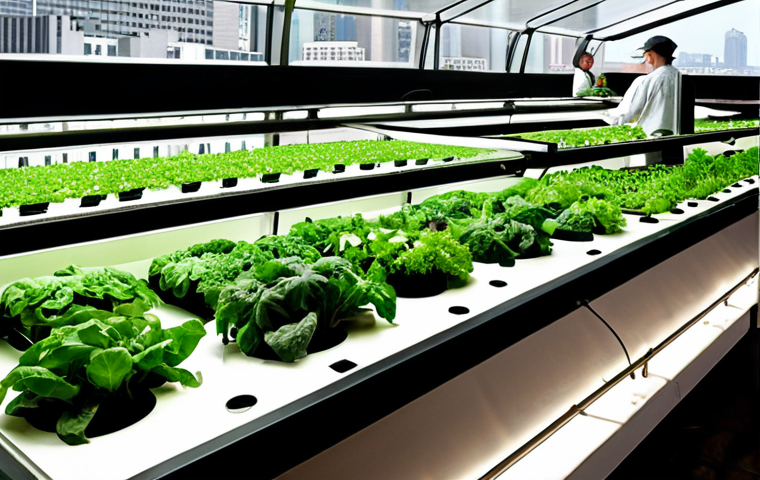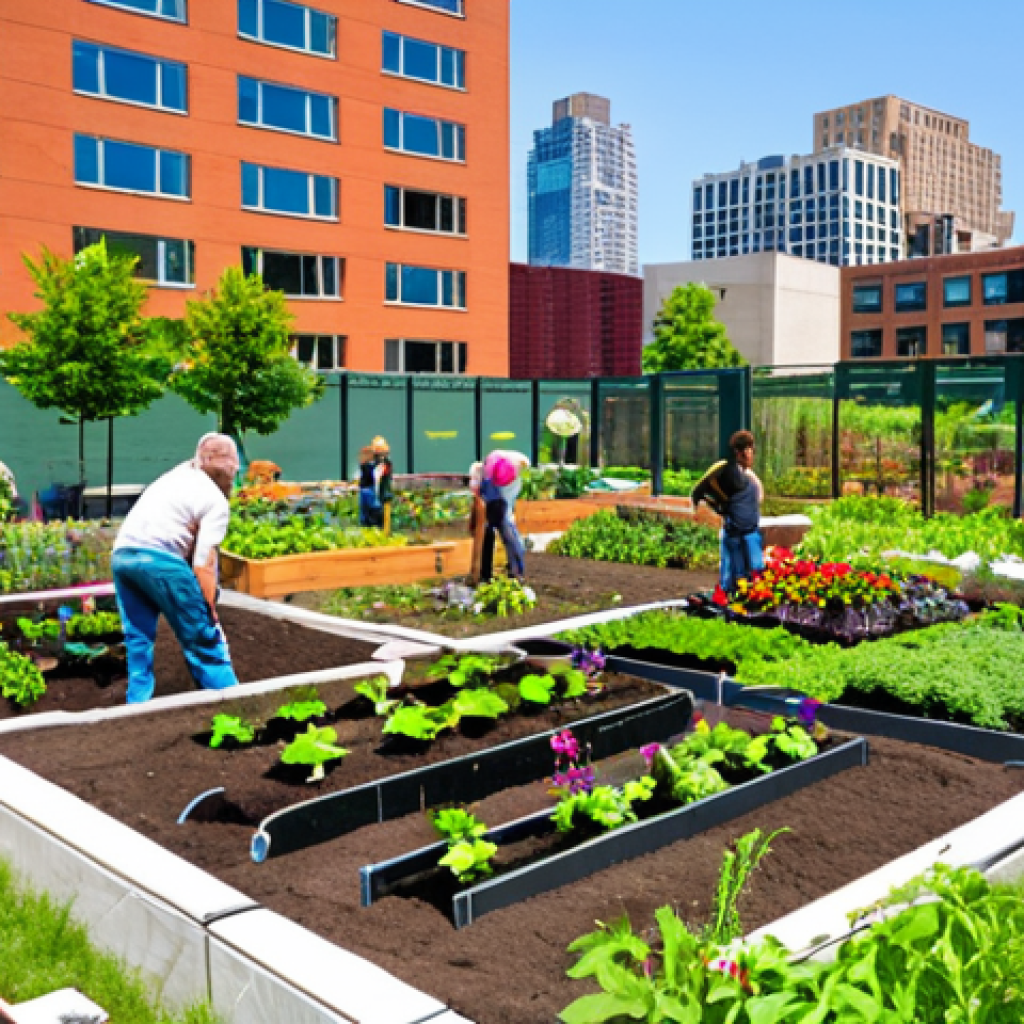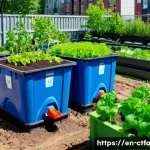Ever wondered about the cool things you can do with an Urban Agriculture Manager certification? It’s more than just knowing your tomatoes from your turnips, trust me!
From designing rooftop gardens that would make New York City jealous, to consulting on community gardens that bring neighborhoods together, the possibilities are surprisingly diverse.
I’ve personally seen how this credential opens doors to a fulfilling career where you can literally sow the seeds of change. Plus, with the growing focus on sustainable living and local food systems, urban agriculture is definitely a field with a bright future.
We can explore how you can carve your own path in this green industry. Let’s dig deeper into what this certification can unlock for you. Let’s precisely clarify what opportunities await you!
Alright, diving right into the exciting possibilities with an Urban Agriculture Manager certification:
Cultivating Community Connections as a Local Food Advocate

Urban agriculture isn’t just about growing food; it’s about fostering a sense of community. As a certified Urban Agriculture Manager, you could spearhead initiatives that bring people together through food.
I’m talking about organizing workshops on composting and organic gardening, leading tours of local urban farms, or even establishing a community-supported agriculture (CSA) program right in the heart of the city.
Educational Outreach and Engagement
* Imagine designing interactive exhibits for local schools, teaching kids about the importance of pollinators and sustainable farming practices. This is a great way to connect with local people.
* Hosting volunteer days at community gardens can be incredibly rewarding, seeing people of all ages and backgrounds working together to grow fresh produce.
Developing Urban Agriculture Policies
* Have you considered working with local governments to develop policies that support urban agriculture? This could involve advocating for zoning changes that allow for rooftop gardens or community farms in residential areas.
Designing Edible Landscapes for Homes and Businesses
Ever thought about turning ordinary spaces into edible oases? With your Urban Agriculture Manager certification, you could design and install edible landscapes for homeowners and businesses alike.
Picture transforming a boring backyard into a thriving vegetable garden, or creating a stunning rooftop farm that provides fresh produce for a restaurant.
Customized Garden Designs
* Consulting with clients to understand their needs and preferences, and then creating customized garden designs that fit their space and lifestyle.
* Selecting the right plants and materials to ensure the garden is both beautiful and productive.
Installation and Maintenance
* Overseeing the installation of the garden, from preparing the soil to planting the seedlings. * Providing ongoing maintenance services to keep the garden healthy and productive, including weeding, watering, and fertilizing.
I can just picture this right now, it is gonna be amazing!
Turning Vacant Lots into Thriving Urban Farms
One of the most impactful things you can do with your certification is to transform vacant lots into thriving urban farms. These spaces can become valuable resources for the community, providing fresh produce, creating jobs, and revitalizing neighborhoods.
Soil Remediation and Preparation
* Addressing soil contamination issues by implementing soil remediation techniques. * Preparing the soil for planting by adding compost and other organic matter.
Crop Planning and Management
* Developing a crop plan that maximizes yields and ensures a diverse selection of produce. * Implementing sustainable farming practices, such as crop rotation and integrated pest management.
Consulting on Sustainable Food Systems for Restaurants
Chefs are increasingly interested in sourcing local, sustainable ingredients for their restaurants. As an Urban Agriculture Manager, you could consult with restaurants on how to integrate urban agriculture into their operations.
Sourcing Local Produce
* Connecting restaurants with local urban farms and gardens. * Helping restaurants design and manage their own on-site gardens.
Waste Reduction Strategies
* Implementing composting programs to reduce food waste. * Advising restaurants on how to minimize their environmental impact. I have done this myself and many restaurants are more than happy to adopt this!
Leading Educational Workshops on Urban Farming Techniques
Sharing your knowledge and passion for urban agriculture is a fantastic way to make a difference. You can lead educational workshops on a variety of topics, from basic gardening techniques to more advanced topics like hydroponics and aquaponics.
Hands-On Gardening Workshops
* Teaching participants how to plant seeds, transplant seedlings, and care for plants. * Providing practical tips on composting, watering, and pest control.
Advanced Urban Farming Techniques
* Exploring hydroponics, aquaponics, and other innovative farming methods. * Sharing best practices for maximizing yields and minimizing environmental impact.
Here’s a quick rundown of some potential career paths and their average salaries in the US:
| Career Path | Average Salary (USD) | Description |
|---|---|---|
| Urban Agriculture Manager | $65,000 – $85,000 | Oversees urban farming operations, manages staff, and ensures efficient production. |
| Edible Landscape Designer | $50,000 – $75,000 | Designs and installs edible landscapes for homes and businesses. |
| Community Garden Coordinator | $40,000 – $60,000 | Manages community gardens, organizes events, and provides educational resources. |
| Sustainability Consultant | $60,000 – $90,000 | Advises businesses and organizations on sustainable food systems and urban agriculture practices. |
| Horticultural Educator | $45,000 – $65,000 | Teaches horticulture and urban agriculture concepts in schools or community settings. |
Developing Innovative Vertical Farming Systems
Vertical farming is the future of urban agriculture, and with your certification, you could be at the forefront of this exciting field. Imagine designing and implementing vertical farming systems that maximize space and yield, using cutting-edge technologies like LED lighting and hydroponics.
Indoor Farming Operations
* Managing indoor vertical farms that produce a variety of crops year-round. * Optimizing growing conditions to maximize yields and minimize resource consumption.
Technology Integration
* Implementing automated systems for watering, lighting, and nutrient delivery. * Using data analytics to track crop performance and identify areas for improvement.
Working with Non-Profits to Combat Food Insecurity
Food insecurity is a serious issue in many urban areas, and as an Urban Agriculture Manager, you could work with non-profit organizations to address this challenge.
This could involve establishing community gardens in underserved neighborhoods, providing educational resources on healthy eating, and advocating for policies that support local food systems.
Community Garden Development
* Establishing community gardens in low-income neighborhoods. * Providing gardening tools, seeds, and other resources to residents.
Nutrition Education Programs
* Organizing workshops on healthy eating and cooking. * Providing information on how to access affordable, nutritious food. These are just a few of the many exciting things you can do with an Urban Agriculture Manager certification.
Whether you’re passionate about community development, sustainable food systems, or innovative farming techniques, this credential can help you turn your passion into a rewarding career.
Wrapping Up
So, there you have it! An Urban Agriculture Manager certification isn’t just a piece of paper; it’s a gateway to a world of possibilities. Whether you’re drawn to nurturing community connections or pioneering the next generation of farming tech, this certification plants the seeds for a fulfilling and impactful career. Now, go out there and grow something amazing!
Good to Know
1. Networking Events: Attend local agriculture conferences and workshops to connect with industry professionals. You’ll find tons of opportunities to collaborate.
2. Volunteer Opportunities: Gain hands-on experience by volunteering at urban farms and community gardens in your area. I can tell you from experience that they really appreciate help!
3. Online Resources: Explore websites like the USDA’s National Agricultural Library and the Urban Farming Initiative for valuable information and resources.
4. Continuing Education: Stay up-to-date on the latest trends and technologies in urban agriculture by taking online courses and workshops.
5. Local Regulations: Familiarize yourself with local zoning laws and regulations related to urban agriculture in your city or town. Every place is different, you know?
Key Takeaways
Earning an Urban Agriculture Manager certification opens doors to a wide range of rewarding careers, from designing edible landscapes to leading educational workshops. You’ll be making a real difference.
The skills you gain will enable you to contribute to sustainable food systems, combat food insecurity, and revitalize urban communities.
Staying informed, networking, and gaining hands-on experience are essential for success in this dynamic and growing field. Never stop learning!
Frequently Asked Questions (FAQ) 📖
Q: I’m based in a smaller town, not a huge city. Is an Urban
A: griculture Manager certification still relevant for me? A1: Absolutely! While “urban” might suggest skyscrapers, urban agriculture encompasses any form of agriculture within or around a town or city.
Think about consulting for local schools to develop educational gardens, helping small farms implement sustainable practices for selling at farmers’ markets, or even teaching backyard gardening workshops.
The demand for local, sustainably grown food exists everywhere, and your certification will give you the credibility and expertise to tap into that demand, no matter the size of your community.
I once worked with a fellow who used his certification to revitalize a small-town park by introducing a thriving community garden – it became the town’s pride and joy!
Q: I already have a background in horticulture. How would getting this certification actually boost my career?
A: That’s fantastic! Having horticultural experience gives you a solid foundation, but the Urban Agriculture Manager certification adds a layer of specialization that can really set you apart.
It’s not just about growing plants; it’s about understanding the unique challenges and opportunities of urban environments, including things like soil contamination, space constraints, and community engagement.
Think of it as the MBA for plant nerds! You’ll learn about project management, grant writing, and policy advocacy, skills that can open doors to leadership roles or even launching your own urban farming business.
I know someone who landed a dream job designing green roofs for commercial buildings specifically because they had both horticultural expertise and this certification.
Q: What kind of salary can I realistically expect after getting certified? Is it worth the investment?
A: Salary can vary quite a bit depending on factors like your location, experience, and the type of role you pursue. Entry-level positions, like assisting with community garden projects, might start around $40,000-$50,000.
But as you gain experience and take on more responsibility, particularly in management or consulting roles, you could easily earn $60,000-$80,000 or more.
Think about the potential to consult for restaurants, schools, or even real estate developers looking to incorporate green spaces into their projects.
Whether it’s worth the investment depends on your career goals. But considering the growing demand for sustainable, locally sourced food, and the unique skill set this certification provides, I believe it’s a solid investment in a fulfilling and increasingly important field.
Plus, the satisfaction of seeing your work directly benefit your community is priceless!
📚 References
Wikipedia Encyclopedia
구글 검색 결과
구글 검색 결과
구글 검색 결과
구글 검색 결과
구글 검색 결과






